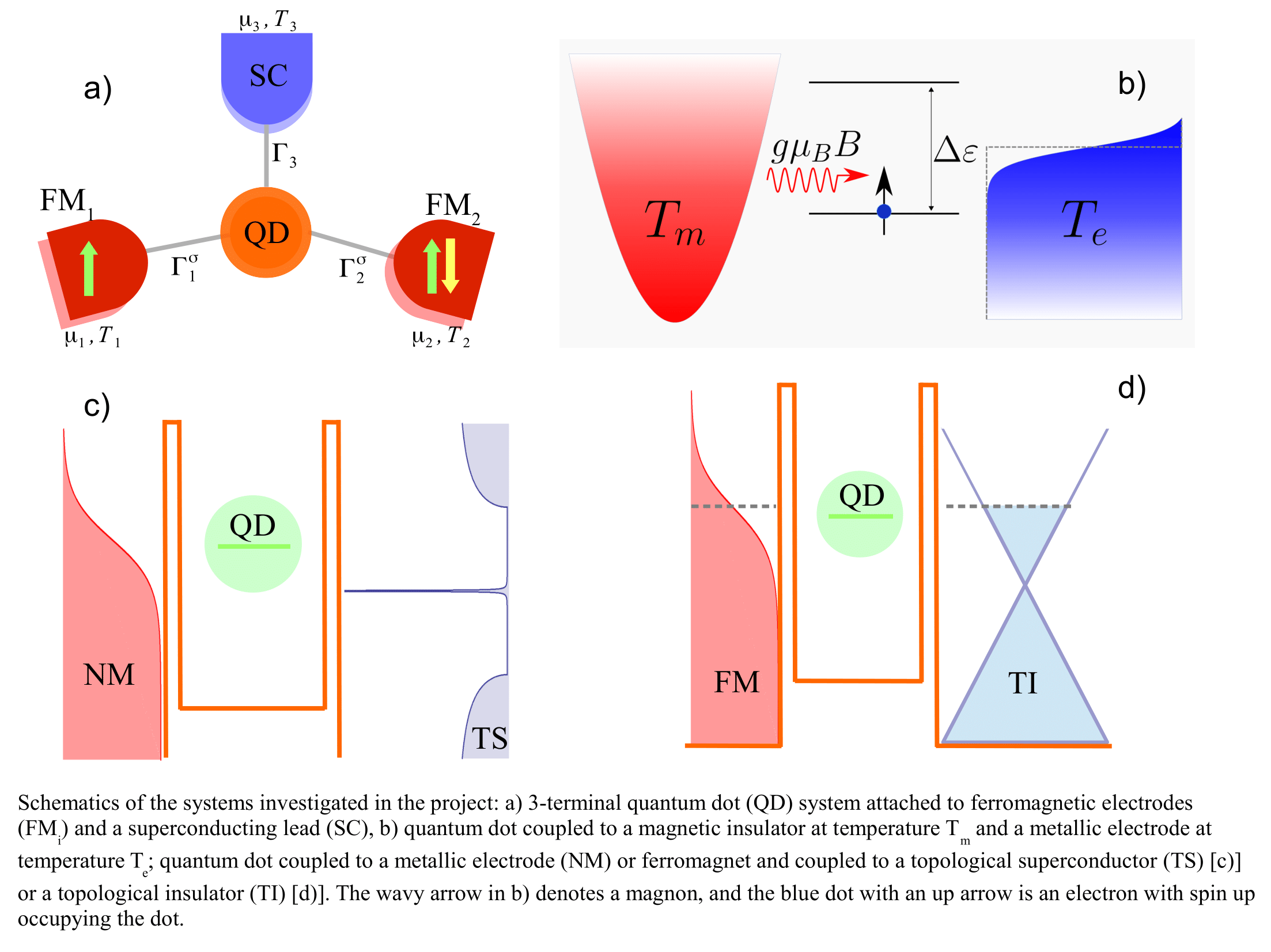Spin-dependent thermoelectric effects in hybrid nanoscopic systems
Description of the project:
PROJECT AIMS:
The key objective of the project is theoretical description of spin-related thermoelectric phenomena in quantum dot-based hybrid systems. Of particular interest is a search for new thermoelectric phenomena arising from competition and/or synergy of magnetism, superconductivity and topology at nanoscale. Fundamental issues regarding to interplay of charge, spin and heat transport through nanoscopic object will be described and analyzed. Model system considered for testing the raised fundamental problems related to spin-dependent thermoelectrics will be a quantum dot (or system of quantum dots) attached to multiple (two or more) external electrodes each possessing different physical properties. The choice of quantum dot systems is dictated by its peculiar properties. Firstly, quantum dot’s properties can be easily tuned and controlled in experiment. Secondly, nanostructures like quantum dots are characterized by totally different and unique thermoelectric response in comparison with bulk materials. Particularly, in nanostructures all the interesting dynamics occur on a scale much smaller than the typical scale over which electrons relax to a local thermal equilibrium. As a consequence, such systems can exhibit much richer physics associated with highly nonequilibrium distributions which is not accessible in bulk materials. Additionally, due to relatively long decoherence length the effects related to quantum interference can be also observed. Thermoelectrics aims to find the best ways of generating large power with the highest efficiency. Despite of the application point of view thermoelectrics also focus on a more fundamental issues. In particular, thermoelectric response give us access to various deeper information on electron transport properties of considered nanostructure. Moreover, hybrid nanostructures, i.e., such as quantum dot coupled to external leads of different properties (magnetic, superconducting, topological, etc.) give opportunity for a search of novel, earlier unknown, physical properties, especially thermoelectric ones. Thus, our studies will be concentrated on spin-related thermoelectric properties of hybrid nanostructure, i.e., nanostructure coupled to external leads possessing different properties which interplay or compete each other. Particularly, we will examine the impact of superconductivity of various symmetry (e.g., s-wave, p-wave), magnetism of metallic ferromagnets and magnetic insulator and topological materials on spin-dependent thermoelectric properties of quantum dot-based hybrid nanostructure. The project is purely theoretical. The calculations will be performed by means of modern but well established methods. The corresponding quantities describing thermoelectric response of the system will be determined and analyzed. The obtained results surely will contribute to the intensification of research on hybrid quantum dot systems and will give us better understanding of spin-dependent thermoelectric phenomena at nanoscale.

Project Team:
Faculty of Physics, ISQI, Adam Mickiewicz University
Dr. Piotr Trocha (PI)
mgr Emil Siuda
mgr Vrishali Sonar
Institute of Molecular Physics, Polish Academy of Sciences
Dr. Damian Krychowski
Publications
Articles:
Spin caloritronics of a quantum dot coupled to a magnetic insulator and normal metal
Sci. Rep. 15, 23208 (2025)
Spin dependent thermoelectric transport in a multiterminal quantum dot hybrid including a superconductor and ferromagnets
Sci. Rep. 15, 14509 (2025)
Impact of Majorana fermions on the Kondo state in the carbon nanotube quantum dot
J. Phys. Commun. 9, 025005 (2025)
Spin-dependent thermoelectric properties of a hybrid ferromagnetic metal/quantum dot/topological insulator junction
Sci. Rep. 15, 4904 (2025)
Thermal Gradient Powering Spin Current in Quantum Dot-Magnetic Insulators Hybrid
J. Supercond. Nov. Magn. 38, 81 (2025)
Thermoelectric properties of a quantum dot attached to normal metal and topological superconductor
Sci. Rep. 15, 3068 (2025)
Out-of-equilibrium voltage and thermal bias response of a quantum dot hybrid system coupled to topological superconductor
J. Magn. Magn. Mater. 596, 171922 (2024)
Non-local thermoelectric transport in multi-terminal quantum dot hybrid system
J. Magn. Magn. Mater. 593, 171745 (2024)
Thermal generation of spin current in a quantum dot coupled to magnetic insulators
J. Magn. Magn. Mater. 589, 171495 (2024)
Spin-thermoelectric effects in a quantum dot hybrid system with magnetic insulator
Sci. Rep. 12, 5348 (2022)
Spin-polarized transport in quadruple quantum dots attached to ferromagnetic leads
J. Magn. Magn. Mater. 546, 168835 (2022)